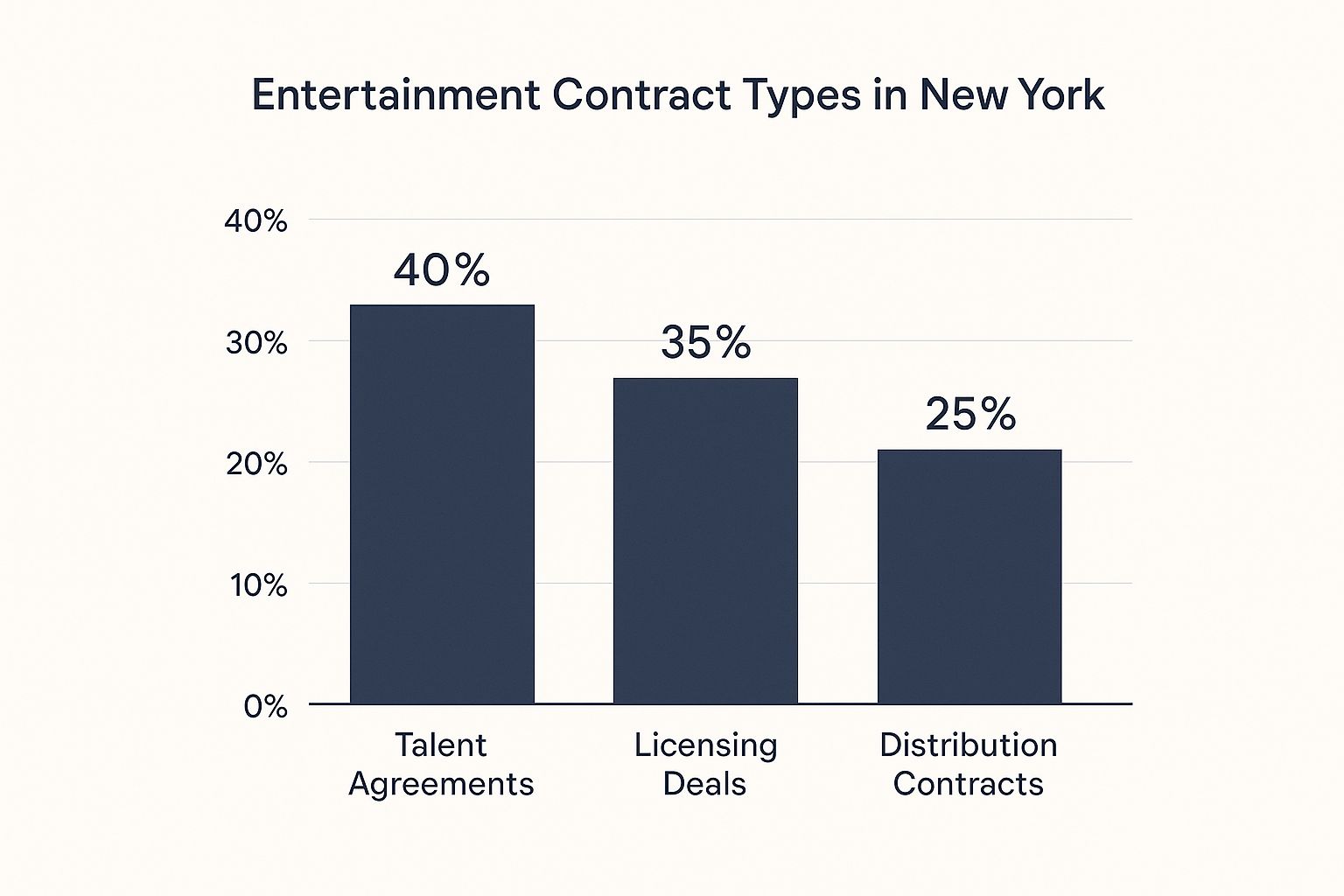Why New York Dominates the Entertainment Law Scene

New York. It's not just any city; it's the city. At least, when it comes to entertainment law. There's a reason entertainment lawyers are packed into this city like Times Square on New Year's Eve. It's a unique blend of all things entertainment: major media companies, Broadway, record labels, publishing houses, and of course, skilled legal professionals. Here at Cordero Law, we’ve witnessed deals completely fall apart in Los Angeles, only to be revived and finalized here in New York.
It's About the Ecosystem
New York isn't just a hub; it's the hub. This concentration of power—both creative and legal—makes a significant difference. Whether you're an independent filmmaker seeking funding or a musician negotiating a record deal, the deals made in New York set the industry standard. These deals influence entertainment contracts nationwide, even if the actual production happens elsewhere.
The New York Advantage (and a Little Secret)
New York's legal framework isn't just about contracts; it's about precedent. Decisions made in New York courts often become the blueprint for other states. Here's something they don't tell you in law school: The intense competition among NYC lawyers benefits clients. Hundreds of specialized attorneys vying for your business means you're likely to receive better representation at more competitive rates. Okay, "better rates" is a relative term in New York. It's still expensive, but perhaps less so than it could be.
This competitive market has positioned New York as a global leader in entertainment law, with top law firms consistently ranked by organizations like Chambers. Firms like Cravath, Swaine & Moore LLP, Debevoise & Plimpton LLP, and Paul, Weiss, Rifkind, Wharton & Garrison LLP have been ranked in the top tier for media and entertainment corporate law for 19 years. That's significant. New York's central role in both legal and entertainment dealings makes it a critical arena for negotiations, contracts, and sometimes, disputes.
So, Why New York?
The ecosystem, the precedent, and the sheer concentration of legal talent all contribute to New York’s dominance. These factors attract creatives and their lawyers to the city. And maybe, just maybe, it's the bagels. But that’s a topic for another blog post. The point is, New York entertainment law is a significant force, and if you’re in the industry, it's something you need to understand.
Contract Landmines: New York Deal Terms That Bite

Contracts are the backbone of the entertainment industry. In New York, these agreements come with a unique set of complexities. I've witnessed talented individuals face significant financial setbacks due to misunderstandings hidden within the fine print.
I once represented a client, "Marcus," who signed a seemingly standard production agreement. Unfortunately, lurking within the legalese, specifically the New York governing law provisions, were critical issues that cost him nearly $200,000.
Let's explore the non-negotiable aspects of New York entertainment contracts, and then we'll discuss areas where you can negotiate and protect your interests.
Deal Points: Where to Dig In Your Heels (and Where to Let Go)
Theater, film, and music publishing agreements each have distinct characteristics. Digital distribution remains somewhat unpredictable, even in 2023.
The data chart below, based on our firm's cases over the past two years, visualizes common sticking points across various entertainment sectors. It shows the percentage of negotiations where specific terms are heavily contested.
The data chart reveals a significant difference between royalty structures and crediting provisions. Royalty structures are frequently contested, especially in music agreements, while crediting provisions are less so. This highlights the growing importance of backend participation and profit sharing in the industry.
Governing Law: New York courts generally uphold contract terms, particularly those related to choice of law. If your contract specifies New York law, be prepared to adhere to its regulations.
Indemnification Clauses: These clauses define liability in case of unforeseen issues. Carefully review these often complex provisions.
Termination Rights: Understanding when and how to exit a deal is crucial. This is often a point of contention, so don't rush this part of the negotiation.
Payment Schedules: Ensure clarity regarding payment milestones, deliverables, and payment triggers to avoid future disputes.
A Quick Word on DIY Legal Work (Don't Do It)
While I encourage client empowerment, some tasks require professional expertise. Reviewing contracts without legal counsel is risky. You might think you're saving money, but this could lead to costly consequences down the road. Remember Marcus and his $200,000 loss? Sometimes, professional guidance is an investment, not an expense. You might be interested in: How to master….
To help illustrate some key distinctions, the table below provides a comparison of standard contract provisions across different entertainment industry segments in New York.
Common Deal Terms Across Entertainment Sectors
| Industry Sector | Standard Rights Duration | Typical Revenue Split | Key Negotiation Points | NY-Specific Considerations |
|---|---|---|---|---|
| Film | Varies widely depending on the type of film and distribution method | Typically heavily weighted toward the distributor/production company | Backend participation, creative control, distribution rights | New York's strong labor laws can impact production costs |
| Theater | Typically for the run of the show, with potential for extensions or renewals | Varies greatly depending on the production's budget and investor agreements | Profit sharing, creative control, authorial rights | New York's theatrical unions have significant influence on contracts |
| Music Publishing | Life of the author plus 70 years | Typically 50/50 split between songwriter and publisher | Royalty rates, copyright ownership, administration rights | New York's music publishing scene is highly competitive, leading to varied deal structures |
| Digital Distribution | Varies greatly depending on the platform and type of content | Highly variable, depending on the platform and revenue model | Content ownership, royalty rates, distribution terms | New York's digital media landscape is constantly evolving, impacting contract terms |
This table highlights the diverse contractual landscapes within New York's entertainment industry. Understanding the nuances of each sector is essential for successful negotiations. Consulting with an experienced entertainment attorney can provide valuable insights tailored to your specific situation.
Intellectual Property: Where Creators Win or Lose Everything

Intellectual property (IP) law can be incredibly complex. Even as an entertainment lawyer in New York, I still find it challenging. For creatives, IP is both the source of great opportunity and potential disaster. Properly navigating IP law can be the difference between success and failure.
Copyright: Register or Regret
Copyright protection is crucial. I advise every client to register their work. It's a fundamental step in protecting your creations. Neglecting copyright registration is like leaving your car unlocked in a busy city – you're inviting trouble.
Registering your copyright is your first line of defense against infringement. Too many creators postpone this until a problem arises. This is similar to buying fire insurance after your house has already burned down. It might seem dramatic, but the analogy holds true. Understanding intellectual property often involves contracts. A solid freelancer contract template can be vital for protecting your work.
Fair Use: Not a Free Pass
Fair use is often misunderstood. It's not a blanket permission to use any content simply by labeling it a "parody." The concept is far more nuanced. I recently handled a case involving a documentary filmmaker who mistakenly believed their work fell under fair use guidelines. They lost their distribution deal as a result.
AI: The Copyright Conundrum (and Future Headache)
AI-generated content presents new challenges for copyright law. Who owns the copyright: the person who entered the prompt, the AI company, or the original creators whose work trained the algorithm? Courts are actively wrestling with these questions. These legal battles will shape the future of the creative industries for years to come.
The complexities of entertainment law in the age of AI were a key focus at the 2025 Loeb & Loeb IP/Entertainment CLE Conference in New York City. Discussions centered on music copyright claims and the legal challenges posed by AI, deepfakes, and publicity rights. The key takeaway? This area of law is evolving rapidly, and staying informed is critical.
Right of Publicity: Don't Mess With It (Especially in NY)
New York has some of the strongest right of publicity laws in the United States. These laws protect individuals from the unauthorized use of their image or likeness. If you're working on any biographical project, understanding these laws is essential.
At Cordero Law, we deal with right of publicity issues constantly. New York's entertainment law landscape is competitive and complex. Every detail matters, and having expert legal counsel is crucial for protecting your career.
Film & TV Production: Legal Hurdles Only New Yorkers Understand

Filming in New York City. It sounds glamorous, doesn't it? And sometimes, it truly is. But there's a significant difference between filming in New York and legally filming in New York. The difference can be a real headache. Just navigating the permit process alone can be enough to drive producers to the brink.
I've personally fielded 2 AM phone calls from frantic producers exclaiming, "My permit for a 6 AM shoot got rejected!" Trust me, it's not a fun experience for anyone involved.
The New York Film Tax Credit: A Blessing and a Curse
The New York Film Tax Credit is a fantastic incentive. Offering up to 30% on qualified expenses, it's a major draw for productions. However, there's a catch. The paperwork required to secure the tax credit is a monumental undertaking. It's a complex, multi-faceted process that can make even the most experienced accountant reconsider their career path.
Location, Location, Complications
Securing location agreements in New York presents unique challenges. Think historic buildings with landmark status and the stringent restrictions that accompany them. Then, factor in the complexities of union rules for site access, which can be a full-time job in itself. And let's not forget the heightened security concerns prevalent in New York City. It's a whole different ballgame compared to filming elsewhere.
Unions: Know the Rules of the Game
New York has its own specific set of union rules for organizations like SAG-AFTRA, DGA, and WGA. If you're not prepared, these regulations can completely blindside your production budget. We're not talking about minor inconveniences; these can be serious deal-breakers.
I once had a client… well, let's just say client confidentiality prevents me from sharing the full story. But suffice it to say, it was a complicated situation.
Insurance: The Necessary Evil (and Potential Deal Breaker)
Insurance is another critical aspect of filming in New York. Productions have been shut down because insurance coverage that was perfectly acceptable in other states didn't meet New York's specific requirements. New York City has its own unique set of regulations, which aren't always beneficial for filmmakers. You might be interested in: How to master…
Child Actors: A Whole Other Level of Complexity
Working with child actors in New York adds another layer of complexity. The regulations here make California's rules seem comparatively relaxed. "Plan accordingly" is an understatement. You'll need a skilled legal team, a dedicated compliance officer, and a whole lot of patience.
Navigating film and TV production in New York City isn't a walk in the park. It's a complex landscape with many potential legal pitfalls. But with careful planning, expert guidance, and a healthy dose of perseverance, you can successfully navigate these hurdles and bring your project to life.
Music Industry Legal Minefields: The New York Edition
The New York music scene crackles with energy. It's a vibrant hub of creativity. But beneath the surface lies a complex web of legal intricacies, especially for emerging artists. While Los Angeles might be the undisputed king of recording contracts, New York City reigns supreme in publishing, performance rights, and the often-murky world of sample clearances. Don't just take my word for it; ask any seasoned music lawyer in the city.
Venues: Where Dreams Go to Die (Legally Speaking)
I've witnessed countless aspiring artists, eager for their big break, sign contracts without fully understanding the implications. I've seen venue agreements that border on, well, let's just say they aren't always the best deal for the artist. I once had a client, Jamie, who signed a seemingly standard venue contract. Buried deep within the fine print, paragraph 17b granted the promoter rights to her next three albums. New York performance venues operate under a unique set of regulations that can significantly impact everything from payment to insurance.
From Stage to Screen: Music Licensing Nightmares
Imagine you're an independent filmmaker wanting to use a specific song in your project. Sounds simple enough, right? Think again. You'll need separate licenses for both the composition and the actual recording. Composition rights are typically handled by the publisher (often located in New York), while the recording license comes from the record label. It's a logistical puzzle. The New York State Bar Association (NYSBA) even has a dedicated Entertainment, Arts & Sports Law Section that addresses these complexities. Their 2025 meeting offered 4.0 professional practice credits and 0.5 ethics credits, highlighting the importance of navigating this legal landscape. Licensing music for film can be a real jungle.
Streaming: Welcome to the Wild, Wild West
The advent of streaming has upended traditional royalty structures. I'm constantly revising contracts to keep pace with the ever-shifting digital landscape. It's a dynamic field, which is both exciting and challenging.
Publishing: Your Future (If You Play Your Cards Right)
New York City and music publishing are practically synonymous. Publishing is where the real long-term financial stability lies. While recording contracts might look impressive on Instagram, publishing is your retirement plan. Any artist neglecting their publishing rights is essentially leaving money on the table.
Rights, Rights, Baby: A Very Brief Overview
Understanding your rights as a musician is crucial. Here's a simplified breakdown:
- Performance Rights: You perform your music, you get paid. Performing rights organizations (PROs) like ASCAP, BMI, and SESAC handle these royalties.
- Mechanical Rights: Someone covers your song, you get paid.
- Synchronization Rights: Your song appears in a film, TV show, or commercial, you get paid (potentially a significant amount).
New York City is a major hub for all these rights, particularly music publishing. So, pay attention.
To further clarify these often confusing concepts, let's delve into a breakdown of music rights specific to New York:
The following table provides an overview of the different types of music rights and how they're typically handled in New York:
"Music Rights Breakdown for New York Artists"
| Right Type | Who Typically Controls | Typical Payment Structure | Notable NY Cases/Precedents |
|---|---|---|---|
| Performance Rights | Performing Rights Organizations (PROs) like ASCAP, BMI, SESAC | Royalties based on performances in public venues, on radio, and online streaming platforms | Broadcast Music, Inc. v. CBS, Inc. (Supreme Court case regarding blanket licenses) |
| Mechanical Rights | Music Publishers | Royalties based on the reproduction and distribution of copyrighted musical compositions (e.g., cover versions, physical copies, digital downloads) | Harry Fox Agency, Inc. v. Napster, Inc. (case involving digital music distribution) |
| Synchronization Rights | Music Publishers and Copyright Holders (often the songwriter) | Negotiated fees for the use of music in audiovisual works (e.g., films, TV shows, commercials, video games) | Numerous cases involving licensing agreements and copyright infringement, often confidential settlements. |
This table summarizes the key players, payment structures, and some landmark legal cases relevant to each type of music right in New York. Understanding these basics can help artists protect their work and ensure they receive proper compensation.
Finding Your Legal Champion: Not All Entertainment Lawyers Are Equal
So, you're searching for an entertainment lawyer in New York City. That's a great first step! But here’s the reality: finding the right lawyer can feel overwhelming. Thousands of lawyers claim entertainment law expertise, sometimes with minimal real-world experience. Just because they’ve glanced at a film contract doesn't make them an expert.
Size Isn't Everything (Experience Is)
Honestly, the size of the law firm matters less than you might think. I know brilliant entertainment attorneys working in small boutique firms who achieve fantastic results. I also know attorneys at huge firms who get lost in the shuffle. The key is their actual experience with your specific needs.
Ask potential lawyers tough questions. Have they worked with Netflix? (I have, and it's not always smooth sailing.) Do they represent artists at your career stage? Do they even return your calls promptly? I've seen clients spend $15,000 at big-name firms and barely interact with the same lawyer twice. That's not representation; it's unacceptable. I once had a client come to me after that exact scenario, and it was a nightmare to fix.
Fees: Hourly vs. Flat (or Even Percentage)
Hourly billing can be appropriate, especially for litigation. However, for many transactions, consider pushing for a flat fee or a percentage-based arrangement. This approach promotes transparency and helps avoid unexpected legal bills. It aligns everyone's interests and allows you to check your email without worrying about another $75 charge. For more information on legal fees and other resources, check out our guide here.
The Right Fit: More Than Just a Resume
Finding the right lawyer isn't just about their experience; it's also about the personal connection. Do you trust them? Do they understand your vision? This is crucial. Entertainment law is intensely personal. You’re sharing your dreams and vulnerabilities. Finding a lawyer who understands this matters – perhaps even more than intricate knowledge of New York contract law (almost).
Finding Your Lawyer (A Tangent, But Important)
Finding the right legal representation is essential for your career, your art, and your future. Treat finding a lawyer like casting the lead role in your own movie. You wouldn’t hire just anyone, would you? The same principle applies to choosing a lawyer.
What About Cordero Law? (Just a Quick Thought)
At Cordero Law, we understand the unique challenges faced by creatives. I'm in my early 30s and work with young, dynamic creators. I understand the hustle firsthand. We offer practical, effective legal solutions without the stuffy corporate atmosphere. It’s your art, your business. We’re here to protect it.
Beyond Contracts: Building a Sustainable Creative Career
Here's the thing most entertainment lawyers won't tell you: a solid contract is only one piece of the puzzle. I've seen incredibly talented clients with airtight contracts still fail because they didn't grasp the business side of the creative world. So, let's talk about what happens after the ink dries. What does a sustainable career actually look like, and how do you build one?
Structures: LLC, Corp, or Just Winging It? (Don't Wing It)
There are significant structural differences between working as an independent contractor and setting yourself up as an LLC or a corporation. I'm talking major tax implications, liability shields (or lack thereof). It's not glamorous, but it's essential. I once spent an entire weekend explaining this to a musician client who insisted he could handle his own taxes. Spoiler alert: he couldn’t.
This is where having an entertainment lawyer in New York, familiar with the intricacies of these structures, becomes invaluable. They can provide guidance on the best approach for your unique situation and help you avoid common pitfalls.
Partnerships: It's Who You Know (Unfortunately)
Let's be honest, the entertainment industry is a relationship game. Talent is crucial, obviously, but building strategic partnerships is how you get your foot in the door and keep it there. These relationships need to go beyond one-off projects.
Think long-term collaborations, mutual support, introductions. It’s like networking, but with less awkward small talk and more shared creative vision. This is especially true in the dense and interconnected entertainment law scene in New York.
Exit Strategies: Always Have a Plan B (and C, and D)
Every. Single. Contract. Needs. An. Exit Strategy. I can't stress this enough. Clear termination provisions are vital. I've had to pull too many clients out of deals they'd outgrown, or that, frankly, were just bad from the start.
The best time to plan your exit is before you even sign. This might seem pessimistic, but trust me, it's pragmatic. Sometimes, the best deal is the one you can walk away from without losing everything. Finding the right legal champion requires understanding marketing, too; consider reading about using SEO for Law Firms.
New York, New York: The Big Leagues (with Big League Challenges)
Creating in New York City offers amazing opportunities but comes with significant challenges. Navigating the legal landscape isn't just about protection; it's about giving you the freedom to create. It lets you focus on your craft, connect with your audience, and (hopefully) build a legacy.
Legal matters can be tedious. But they also form the foundation of a sustainable career. Ready to take control of your creative career? Contact Cordero Law today. We're here to help you navigate the complexities of entertainment law in New York, so you can focus on what you do best: creating. Visit us now to schedule a consultation.
